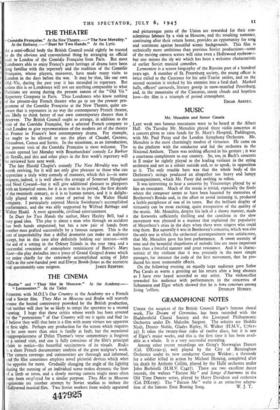THE CINEMA
Rodin " and " They Met in Moscow." At the Academy. Lermontov." At the Tatter.
RUNNING with M.O.I.'s Our Country at the Academy are a French and a Soviet film. They Met in Moscow and Rodin will scarcely arouse the heated controversy provoked by the British production, but neither will they be so likely to tempt the spectator to a second viewing. I hope that those critics whose wrath has been aroused by the " pretensions " of Our Country will see it again and find (as I believe they will) that here is a film with many virtues not apparent at first sight. Perhaps any production for the screen which requires to be seen more than once is fatally at fault, but the occasional inappropriateness of Dylan Thomas's verse commentary is forgiven at a second visit, and one is fully conscious of the film's principal claim to notice—the beautiful succinctness of its visuals. Rodin is a short French documentary analysis of the great sculptor's work. The camera coverage and commentary are thorough and informed, ,nd the film sometimes employs novel pictorial devices which whet the appetite for more. Gradually changing the angle of the lighting during the running of an individual scene makes dynamic the lines .4 a limb or torso, and a slowly moving camera might more often have been empToyed for a similar purpose. They Met in Moscow represents yet another attempt by Soviet studios to imitate the I Iollywood musical film. Two Soviet workers from widely separated
447925
and picturesque parts of the Union are rewarded for their con- scientious labours by a visit to Moscow, and the resulting romance, continuing after their return home, provides an cpportunity for song and sentiment against beautiful scenic backgrounds. This film is technically more ambitious than previous Soviet productions—some of the moving camera scenes will raise even a Hollywood eyebrow-=- but one misses the sly wit which has been a welcome characteristic of earlier Soviet musical comedies.
Lermontov is a screen biography of the Russian poet of a hundred years ago. A member of St. Petersburg society, the young officer is twice exiled to the Caucasus for his anti-Tsarist satires, and on the second occasion is tricked by his enemies into a fatal duel. Masked balls, officers' carousals, literary gossip in snow-mantled Petersburg, and, in the mountains of the Caucasus, storm clouds and hopeless love—the film is a triumph of period atmosphere.
EDGAR ANSTEY.




























 Previous page
Previous page